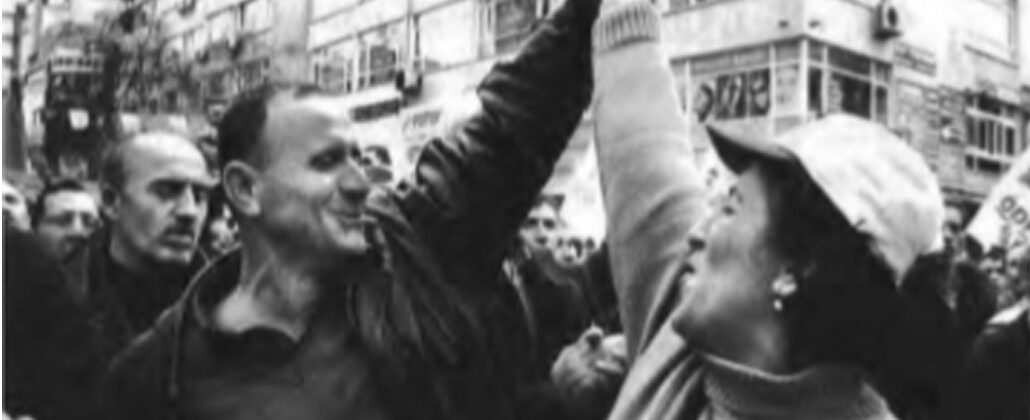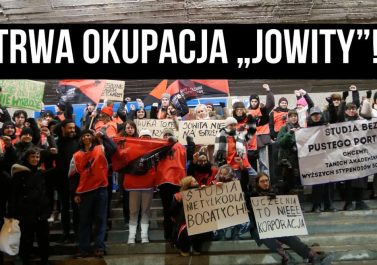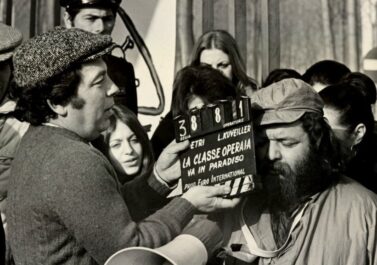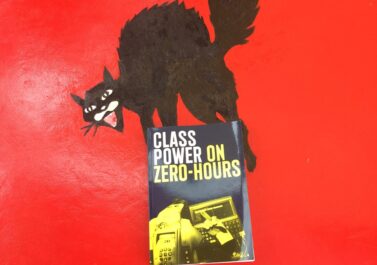We discussed this text during our general meeting in early November. We will publish a summary of the minutes at some point soon.
This is the first time in my life that I have tried to speak about the development of class consciousness. I’ve always been in a party or in some campaign with papers, propaganda and all the other assets of a political movement and just got on with things. When I bumped into the Angry Workers, suddenly there I was with a handful of people and nothing much else but some ideas. Surrounded by a world in chaos, with countless political groups posting up their recipes for salvation, I began to think about the relation between my own ideas and the development of working class consciousness.
In the English civil war the rising bourgeoisie confronted the old feudal aristocracy with its figurehead, the king, who claimed his position of god’s chosen mouthpiece. Cromwell and his followers fought for their vision of the right of all men to talk to god equally. Behind this religious battle was an earthly battle between the classes – the owners of land versus the owners of capital. But the radical elements of Cromwell’s movement took the demand for the equality before god a step further and demanded the equality of people on earth – an equality of wealth and responsibilities.
The victorious bourgeoisie cut off the king’s head but then did a deal with the old aristocracy to exclude the masses from having any say in the distribution of power and wealth. The Levellers, Diggers and other radical elements were crushed and yet their ideas lived on and re-emerged in different forms across Europe and in America.
The development of industrial society and towns with the appalling conditions for workers brought new cries for the end of the inequality between rich and poor – both from workers and from enlightened members of the elite. There began to emerge the first socialist ideas and writings but these mostly came intermingled with religion and indeed led to divisions within the church seeing the growth of non-conformism that drew support from the working classes. The heaven of the hereafter remained but a heaven on earth was also called for – William Blake’s Jerusalem for example.
Even the growth of secular, non-religious and anti-religious socialism still used the same ideological framework as their religious forebears. They decried the suffering of the poor, cursed the power and privilege of the rich and painted a picture of a different future society – a utopia. Yet, like their religious socialist forebears, the gulf between the awful present and the utopian future would be overcome by converting people – rich and poor – to their vision, to their cause. In fact they often paid more attention trying to convert the rich as they were clearly the people with the power to change things. Some were indeed converted – people like the mill owner Robert Owen who first built his workers community in New Lanarkshire and then went on to set up his ‘communist’ mill in the US where he was bankrupted by the other mill owners.
In philosophical terms all these early socialists were idealists – not because they had ideals – but because they thought that the world and society were made and changed by ideas – that consciousness determines ‘being’ – the totality of human existence. So if you change people’s ideas you will change the world.
Meanwhile away from the world of politics in another sphere of human knowledge, people investigating the natural world were rejecting the guiding hand of god as creator and source of all motion. They began to describe a world governed by its own logic, its own laws of motion and change, a world that moved irrespective of the thoughts of humans and without the need for an external almighty mover. This outlook became known as materialism – again not the meaning that people use to mean the love of things – simply a philosophical view of the world where matter, things, nature are primary and human thought is secondary or a re-flexion of that natural world.
This materialist view of the world was taken up by the socialists and others looking at the development of society. Men like the German socialist Ludwig Feurbach who argued that men had created god and not vice versa. He now located human beings and the society they had created within this ‘nature’ that developed according to its own laws, not according to the dreams of humans. Addressing the pitiful state of the vast mass of people – the workers – he argued that changed circumstances would change people. The workers created all the wealth but lived impoverished lives. Put an end to class society and you would change the nature of people.
But there was a huge problem here. A changed society would change people. The working class in a changed society will be a changed people but how was the change to occur? Feurbach’s socialism still left the central role of the ‘teacher’, the educator, the person who sees the needed change and passes on this knowledge. For all his materialism, for all his ‘being determines consciousness’, he was still left with the preacher as the agent of change.
Marx and Engel as young men were followers of Feurbach, having both come to the cause of socialism from comfortable middle class backgrounds but with a growing hatred of everything they saw in existing society. They came to challenge Feurbach’s views. Impacted by both Hegel’s writings on dialectics and by the first revolts of the embryonic workers movement, Marx and Engels rejected – or better – transcended Feurbach’s materialism and his socialism.
Feurbach and fellow materialist socialists saw that humans come to know their world, developed knowledge, through their activity but for them ‘activity’ was seen only as contemplation or investigation – which of course put the contemplator or investigator in an elevated position – the philosopher, the studier of the world.
Marx and Engels, breaking through this mystique of the ‘investigator’ saw activity through which knowledge is gained as ‘work’, not contemplation, but work – the fundamental activity of human beings, if you like the planting and harvesting of potatoes – something that seemed insignificant in the world of philosophers. Work done by people who are part of the natural world, acting upon the natural external world and in doing so, changing it and themselves.
Further, while most writers saw society composed of individual people, gaining knowledge individually , Marx saw real people living in real societies within real social relations, now dominated by capital and driven by capital’s need to self reproduce.
So now, for Marx, the materialist outlook that ‘being’ – the totality of existence – determines human consciousness had to recognise that ‘being’ is the actual world of existing class relations, and it is this actual world that shapes consciousness and that this world, this being, is already shaped by previous human activity and is constantly being reshaped by it. In their famous theses on Feurbach, Marx and Engels’ write –
The Materialist doctrine that men are products of circumstances and upbringing and that therefore changed men are products of changed circumstances and changed upbringing, forgets that it is men who change circumstances and that the educator himself must be educated.
Suddenly the preacher is gone. The educator – now the communists – still has a role but it is people – the working class – in their daily struggle against capital who will develop the practical consciousness necessary to overthrow its domination.I have gone through this very over-simplified history of ideas because I want to go on and show that most of the ‘Marxists’ and revolutionaries who claim allegiance to Marx’s writings, in fact ignore his overturning of Feurbach, ignore his concept that it is the working class in their struggles who develop the consciousness needed to transform society. In fact they go back to the materialism of Feurbach with the weird, unexplained role of the educator, the preacher, the person who knows what the working class must do. Even though they will over and over repeat that it is the working class who must liberate themselves they combine this magically with their own role as leader, as the person who knows where the masses must go. In 1844 there was an uprising of workers in Silesia. This had a big impact on Marx and helped to deepen his understanding of the role of the working class – he learnt from it, not the other way round. Other people saw this uprising as limited, as an isolated event but Marx was able to see its revolutionary implications, even when there was only this embryonic working class. For him it represented the human protest against a dehumanised life. The workers were no longer simply an object of pity or noble beings or the potential recipients of propaganda for a philosopher’s utopia, but workers as the real revolutionary force in society, developing a practical consciousness in their unavoidable struggle to overcome the existence to which capital subjugated them. They were forced to fight against their dehumanised existence not just in the sense of their material poverty or even cultural poverty but in a much more profound sense. When they are forced to sell the commodity, their labour power, their ability to work, to the owner of capital who sets it work, the truly human nature of work – the collective efforts of humans to reproduce the conditions for their collective survival – is suppressed. It is this suppression and destruction of the truly human in the production process under capital that makes the working class the revolutionary antagonist of capital. All kinds of reforms can be won to improve the workers conditions but not only can they be taken away again, as long as capital dominates, the real humanity of the worker and the working class is denied and only its total, revolutionary abolition can put an end to the existence of the workers as prisoners of their work. I’m not here going to go into the other side of capital’s drive for its own self reproduction – the ever growing destructive nature of the production of things completely beyond the control of any rational, social, collective assessment of human needs. Look, for example, at the covid crisis, very much a product of capital’s globalised production process but a threat that sees class societies’ complete inability to develop a collective rational response. This lack of any form of collective control for the common good, both in relation to covid but also the environment etc etc, is now threatening the very existence of human life.
It is against all this that the working class is forced to fight and find the ways, through its struggles, through its organisation, to assert a collective, socialised control.
Marx and Engels, right at the birth of a working class movement, wrote the Communist Manifesto and put at the centre of it this revolutionary force of the working class, a force that had to find its own ways to organise its own emancipation. Of course knowledge of the past and even visions of the future can be passed from person to person. Why else bother to write the Communist Manifesto? We read, we study history, we debate and develop our ideas, in other words consciousness can impact on consciousness but only in a limited way, only to the extent that an individual’s experiences makes sense of this passed on knowledge. And above all this kind of knowledge transference is limited to the passing on of what is already known. But the forms and content of future struggles are not known in advance and have to be discovered by the working class itself, in struggle. And it is this ‘new’ that has to be studied, has to modify previous expectations and placed at the heart of the communist’s agitation.
Since the publication of the Communist Manifesto millions of people around the world, in the course of the struggles, have found inspiration in its analysis of their situation. Countless numbers of revolutionaries have thought they were following in Marx’s footsteps. They will all agree on the role of the working class but really go back to the pre-Marx view that being determines consciousness – full stop. Back to Feurbach. The working class reduced to being a kind of battering ram whose direction comes from somewhere outside the class. For them revolutionary consciousness, i.e. the consciousness of the necessity of revolution, is an already known thing, They know it – so all that is needed is a way of delivering that known consciousness, and the way becomes propaganda and above all – the party or the sect, the possessor par excellence of revolutionary consciousness. They like the struggles of the working class only because they feel that creates a fertile ground for passing on their recipes.
Lenin in ‘What is to be done’ spelt out that revolutionary consciousness can only come from outside the class – from the party, even if he did moderate his views later they fundamentally remained the same. The party now replaces the old preacher. From the party as embodiment of revolutionary consciousness comes party loyalty. Lenin’s great skills as an organiser and the Bolshevik’s apparent triumph meant that Lenin’s writings on all subjects became bibles for later generations. But Lenin’s reversion to the pre-Marx materialism, with the working class simply as object, acted upon by nature, totally suited Stalin and the Soviet State. Stalin’s writings on consciousness approvingly quotes Feurbach but makes no mention of Marx’s repudiation of it.
Trotsky took up his vital and indefatigable battle against Stalinism and the Fourth International became the centre of this struggle. But, as with Lenin, his disciples took uncritically everything he did and wrote. In 1928 when sections of the Soviet working class came into collision with the state that was demanding more and more work from them, Trotsky, leader of the left opposition, sided with the state against the workers. The 4th international, with its ‘crisis of humanity is reduced to the crisis of working class leadership’ replicated Lenin’s one sided materialism. No matter how many times you repeat that the working class is the revolutionary force in society you strangulate this revolutionary force if you think you know in advance what the working class must do, if you prescribe in advance how its must conduct its struggles and try to fit it into your pre-ordained programme.
No matter how much a vision of the future, a utopia, can inspire people, the working class does not fight out of the pursuit of a dream, but out of the necessity to fight against the present dehumanised society and it is in doing this that they discover that they have to put an end to the rule of capital. This consciousness does not come ready made, written down, presented in books or by a party. Against all the present day Marxists who think they know the answers, want to tell the working class what they need to do, how to proceed, Marx’s words need repeating over and over, ‘The educators themselves have to be educated’.
Yes of course the militants, not as outsiders, but those workers who have developed the knowledge of the underlying nature of society have a role to play, to pass on this history of human culture and experience, to pass on the understanding of the crisis of society and the need for revolution, to propose forms of struggle, but the militant has to understand that they don’t have the answers and that working class communist consciousness is developed by the working class in struggle, in opposition to what the present society is denying in terms of human needs. This consciousness is not yet known – to anyone. So we, the militants, as part of the class, not something over and above it, have to discover forms of struggle through which the practical political consciousness can develop, i.e. as part of the working class’s own need to revolutionise practice.
This view of the development of working class consciousness in no way negates the role of the militant. I end with a quote from the Communist manifesto.
‘The communists are distinguished from other working class parties by this only;
1 In the national struggles of the proletarians of different countries they point out and bring to the front the common interests of the entire proletariat, independent of all nationality.
2 In the various stages which the struggle of the working classes against the bourgeoisie has to pass through, they always and everywhere represent the interests of the movement as a whole.
………….The theoretical conclusions of the communists are in no way based on ideas or principles that have been invented or discovered by this or that would-be universal reformer. They merely express, in general terms, actual relations springing from an existing class struggle, from a historical movement going on under our very eyes.’
There is hardly a left group in existence that really proceeds in this way.



